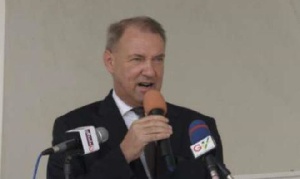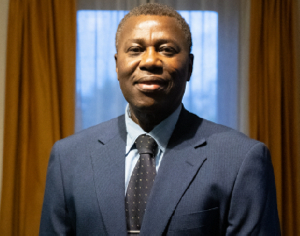Ghana’s frozen chicken imports jumped from 13,000 metric tons in 2000 to over 155,000 metric tons in 2011 costing $169 million, Mr Ron Strikker, the Netherlands Ambassador to Ghana, said on Wednesday.
Figures showed that in 2017, a total of over 135,000Mt (about 112 million birds) of frozen chicken was imported from European Union (EU), which is 76 percent increase over the 2016 EU import.
The Netherlands Ambassador however, predicted a potential growth of the country’s local poultry industry in the next few years, due to an increase of six per cent consumption of chicken per year.
But, Mr Strikker expressed discomfort that consumption of chicken had not kept pace with demand in Ghana due to high cost of poultry feed, inadequate processing and inefficient feed management leading to huge imports of frozen chicken.
This, he added has pave the way for large importation of frozen chicken into the country to meet the national demand of 175,000Mt.
Mr Strikker made this known at the opening session of the 2018 Poultry Value Chain Fair (POVAC), underway in Sunyani.
It is being organized by the Ghana Poultry Project (GPP) in collaboration with the Assist Management in Poultry Layer Industry by Feed Improvement and Efficiency Strategy (AMPLIFIES), Ghana National Association of Poultry Farmers (GNAPF) and the Ministry of Food and Agriculture (MOFA).
Under the theme “ Employment creation along the poultry value chain: Public private partnership approach”, the two-day event is being attended by aggregators, input suppliers, feed manufacturers, poultry farmers, egg traders and transporters. Activities lined-up include exhibition and food bazaar.
Mr Strikker noted that chicken continued to remain one of the most important sources of Ghanaian protein, but expressed regret that the current output of most farms in the country was approximately 2.1 million birds.
The national potential output was estimated at 4.4 million birds, he said. In the quest to boost local poultry production, Mr Strikker said quality inputs such as feed and day old chicks with fewer diseases, less mortality and persistent production were needed to enhance production of meat and eggs.
However, the recent introduction of the 15 per cent VAT on imported day old chicks could make it harder for farmers to access the best available inputs and create a modern poultry sector, he added.
Mr Strikker said the Netherland government looked forward to discuss with the Ghana Government how to ensure that the best quality input remained available. “The Netherlands is home to some Europe’s most successful poultry meat and egg producers. The country with only 17 million people has 83 million chickens. That is why it is good to do business with the Dutch,” he said.
Dr Gyiele Nurah, Minister of State, Food and Agriculture in-charge of Livestock, said value addition to poultry products was necessary and must be a production reality to push the country’s growth beyond aid agenda.
He stressed government readiness to promote and support strategic investments within the agricultural sector, including poultry industry for its modernization to deliver multiple benefits towards sustainable agriculture development that was inclusive of and empowered the small holder farmer.
Dr Nurah observed that the local poultry sector continued to grow but with minimal participation of local actors, especially in production, saying the total domestic supply of broiler meat was less than 25 per cent at 35,000 tons, whilst imports increased by 14,000 ton to reach 158,000 tons in 2017.
“Demand for broiler meat in Ghana is ever increasing; meanwhile, domestic supply remains mostly stagnant allowing imports to fill the gap,” he said.
Dr Nurah said it required collective commitment of all actors to strengthen capacity to lead productivity, promote profitability and drastically cut or eliminate the import of poultry and poultry products. Mr Victor Oppong Adjei, the National Chairman of the Ghana National Association of Poultry Farmers (GNAPF) observed that the country’s economic policies had created opportunities for a large importation of frozen chicken which had virtually downplayed chicken production by local farmers.
This has thrown many local farmers out of business, as a result leading to job losses and impoverishing citizens through unemployment.
He said the poultry industry remained a multi-billion dollar industry, with a huge formidable value chain of creating over a million secured jobs in the country. “This is an industry which has a great potential for economic and developmental growth of the country, by eradicating poverty among the people and empowering them for their social requirement,” he added.
Notwithstanding the fundamental attributes of the poultry industry to the economy, Mr Adjei expressed regret that successive government had paid little or no attention to enhance the sector.
Business News of Friday, 23 March 2018
Source: ghananewsagency.org













